
On 3 July, spiritsEUROPE unveiled the latest export figures for the EU spirits sector – €8.84 billion in 2024, a 2% decline in value compared to the previous year – alongside an analysis of the international headwinds and growth prospects shaping our industry, and concrete recommendations for the road ahead.
These findings were presented at the 2025 spiritsEUROPE Trade Review, which brought together more than 100 delegates from EU institutions, third‑country missions and the private sector. The event featured a keynote address by Pierre Bascou, Deputy Director‑General at DG AGRI, and a speech on “Mexico & Europe: A Spirited Partnership for Trade and Tradition” delivered by Francisco Tovar, First Secretary for Economic Affairs, on behalf of H.E. Ambassador Rogelio Granguillhome Morfín. Discussions focused on the growing impact of geopolitical tensions and tariff threats, as well as opportunities created by the recent acceleration of the EU’s trade negotiations agenda, including with Mexico and with the Mercosur block.
With over 60% of EU spirits exports concentrated in just three markets – the United States, China and the UK – the stakes are high. The transatlantic relationship, in particular, remains a top priority. Recent tariff developments with the US continue to generate much uncertainty, but spiritsEUROPE welcomes the EU’s continued good‑faith efforts to reach a negotiated solution by 1 August and avoid the imposition of 30% tariffs on EU products. Together with our counterparts across the Atlantic, we call for a swift deal and a return to the zero‑for‑zero tariff framework that has underpinned decades of transatlantic trade success.
China was another key focus, with the publication of the final determination in the anti‑dumping investigation into EU brandies coming just one day after our Trade Review. To our regret, the Chinese Ministry of Commerce imposed final duties averaging 32.2% on EU wine‑based and marc‑based spirits, despite clear evidence disproving any dumping practices. While we welcome the price undertakings that provide partial relief for certain companies, far too many EU producers remain exposed to steep tariffs. This partial relief, secured through sustained EU and French diplomatic engagement, must now be extended to all compliant companies, and duty‑free channels fully reopened. Looking ahead to the EU‑China Summit on 24 July, we urge leaders on both sides to seize this opportunity to de‑escalate trade tensions and deliver a political breakthrough that restores stable, predictable market access in the world’s largest spirits market.
These immediate challenges also highlight a reality we cannot ignore: the EU spirits sector’s success still depends overwhelmingly on a handful of major markets. For many of our members, protecting and restoring stable access to the United States and China is the clear priority – and rightly so, given their unmatched scale and dynamism.
At the same time, diversification remains an important part of building long‑term resilience in today’s uncertain global environment, even if it cannot replace the weight of those core markets. Emerging markets can complement our growth and help protect the rural jobs our sector supports, but they require patience and often come with complex regulatory hurdles.
That is why we support a trade agenda that is both ambitious and realistic: one that defends our position in key destinations while steadily improving conditions elsewhere. The EU‑Mercosur Agreement offers meaningful opportunities through full tariff elimination and protection of Geographical Indications, and we urge its swift ratification. India holds even bigger potential, provided tariff cuts are deep, across all spirits categories, and not undermined by higher internal taxes. Promising ASEAN markets are also emerging, but regulatory barriers must be addressed alongside tariff liberalisation.
And of course, while trade agreements are vital enablers of diversification, they are not enough on their own. They must be accompanied by sustained promotion and economic diplomacy to turn market potential into long‑term success, requiring a strong & substantial dedicated budget in the next Multi-Annual Financial Framework.